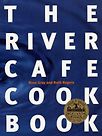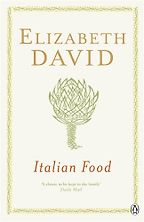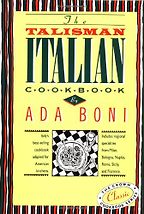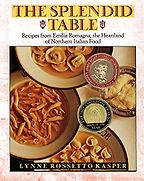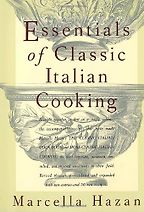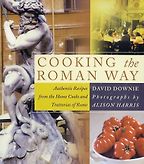When was the first time you went to Italy and were introduced to Italian food?
I went to Italy for the first time in 1970 when I was about 23. I went with my husband who is Italian, born in Florence. As an American, I had always thought Italian cuisine was the kind of Italian food I had growing up in New York, which is very heavy and more based on southern Italian cooking. Lots of meatballs, thick sauces and melted cheese. Then I got to Italy and I found out that actually Italian food was grilled fish with wonderful herbs from the garden; or a soup made of bread, tomatoes and basil and nothing else; or vegetables that were just boiled and had olive oil sprinkled over them. It was a revelation to me, and incredibly exciting to see this kind of Italian cooking.
How often do you visit Italy, and do you still take your chefs out with you?
In fact I’m going this week with 13 chefs, and then again at the end of the month. I go to Italy four or five times a year. This week we will taste some new olive oil and some new wines.
Has Italian food changed much over the years?
The only thing that has really changed is that there is more communication between different regions. It used to be so strictly regional that you literally couldn’t get food from one region in another. You practically couldn’t get mozzarella outside of Naples. Although there is still regional pride today, you can get ingredients from all over. But Italian food is very regional. City to city, town to town, even family to family.
“Italian food is very regional. City to city, town to town, even family to family.”
Why do you think that is?
Italy didn’t become a country until very late [the mid 19th century] and so different regions grow different foods. What you can grow in Piedmont is very different from what you can grow in Sicily, and that is reflected in what they eat. You have fish in the south and pork in the north, chillies in the south and cream in the north, and so on.
The River Café opened in London more than 20 years ago now. In that time, do you think Britons have learnt to love and appreciate food like the Italians?
I think Britain is changing. But with France and Italy, food is part of the culture and not just a question of more wonderful restaurants opening, as has happened in London. You can get into a taxi in the middle of Rome and the driver will give you a recipe to make the best fettuccine. You can walk down a small street in France or Italy and smell bread being baked as they probably did a hundred years ago. England has changed remarkably in terms of the restaurants on offer – especially multicultural restaurants – and there are good ingredients sourced straight from farms, but there isn’t the culture of food that there is in Italy and France.
Let’s turn to your first book, Elizabeth David’s Italian Food, first published in 1954. How important was Elizabeth David in changing British eating habits?
She was crucial. This was before my time as I didn’t come to England until 1970. Certainly if you asked my business partner Rose [Gray] or anyone who is really interested in cooking, they would say that the influence of Elizabeth David is phenomenal. She took ingredients, she took seasonality and she used olive oil. Apparently, before Elizabeth David you had to buy olive oil from the chemist. She introduced recipes that people had never heard of before. She wrote about it beautifully, and she cared. She was amazing.
The book is not just recipes but also descriptions of ingredients and places.
She loved to travel and live in other places, and she was a great writer. You can take any of Elizabeth David’s cookbooks to bed and read them as you would a novel. She’s telling you, when you get a lemon or a tomato or have a piece of veal, this is how you should think about it, not just here’s a recipe for it.
What do you love about Italian Food in particular?
I love her introductions to each chapter – especially the one on pasta, and also rice which leads you to all the different kinds of risottos. It’s so full of knowledge and passion. I think it’s a really inspirational book.
Your second choice is The Talisman Italian Cookbook by Ada Boni.
This is a book my mother had on her shelf. Ada Boni wasn’t as prolific as Elizabeth David but she had a wonderful style of writing. She keeps everything very simple. She writes about the essence of Italian food and communicates that in her recipes. She can make someone who doesn’t cook want to cook her food.
Boni was a professional food writer, and this is one of the first books that was written for the Italian housewife rather than the professional cook. The recipes do have an everyday feel to them, don’t they?
Exactly.
She came up with this lovely quote: “Cooking is the most gay of arts and the most pleasant of sciences.”
I totally agree. It’s a combination of science and art. It’s about detail and spontaneity. It’s a balance. You can see that in the books I have chosen. Marcella Hazan is much more detailed in her recipes. She is almost a dictionary of Italian cookery. If you follow her recipes, step by step, ingredient by ingredient, you won’t make a mistake. Elizabeth David is more vague – you take a few tomatoes, put them in a pan with some olive oil and garlic and so on.
Although Ada Boni collected recipes from all over Italy, many of her recipes were from central Italy around Rome, where she was from. What are the characteristics of food from this area?
In central Italy you have quite a lot of meat. You don’t have much fish. You have lentils, beans, pork. Moving south there is more fish, and in the north is much richer food.
Interestingly, of the five books you have chosen this is the only one written by an Italian who lived in the country all her life. Is that because there is more of an oral than written tradition for handing down recipes in Italy?
That’s how I learnt, mostly. By staying with a family, being with them, cooking with them. My cousins also taught me.
Get the weekly Five Books newsletter
There is a strong link between family and food in Italy.
That link is very important. Before I could speak Italian, I would just listen to the way people in a family kitchen would argue about what to do with a recipe.
Your next book, by an American, focuses exclusively on the Emilia-Romagna region of northern Italy. Why is this region so important?
It’s a very interesting area. It’s between Milan, Venice and Florence and includes Parma, Bologna and Modena, which are amazing centres of cooking. It’s a region that is rich and very proud of its food. Bologna is where you have bollito misto, which is mixed boiled meats. It’s an extraordinary celebratory dish which you very often eat at Christmas. You’ll have boiled beef, boiled chicken and cotechino sausage. You serve it with lentils and salsa verde. It’s delicious.
Why is this book important?
There are some books for when you are in a hurry and want to do something quick, but when I really have time to cook and make a long, slow recipe, this is the book I go for. It’s for making your own pasta and slow-cooked sauces. It’s not just about meat on the grill, it’s much more intense. It’s salivatory.
You commented earlier about your experience of Italian food growing up in America, that it was chiefly from southern Italy and quite heavy. Has northern Italian food now grown in popularity in the US?
Oh yes. In New York you can definitely find more regional Italian. There are Roman restaurants as well as Florentine and Venetian. It is much more sophisticated now.
So it’s not just sauce and meatballs like you see in The Godfather and The Sopranos?
Exactly. Hopefully those days are over.
Why did you choose this book?
Marcella Hazan really is a teacher. When people come to work at the River Café as a chef we ask them if they have read this, and if they haven’t we ask them to read it. She is a very disciplined and thorough chef. She takes you through each step and really cares about the way you go through a dish. She doesn’t talk too much about only using a certain tomato in the summer or only serving a certain dish in the winter. She’s not that seasonal but she really cares about the ingredients. I also love the drawings in this book. She’ll tell you how to prepare an artichoke or how to roll out the pasta dough using illustrations. She revolutionised Italian cooking for a very wide audience.
She has been credited with starting the craze for balsamic vinegar, which some people say is now overused.
You don’t want to judge Marcella on whether she did or she didn’t. Just look at her body of work, it’s extraordinary. If you were going to gift books to someone who wanted to start cooking Italian food, they would get a very good grounding with Marcella Hazan and Elizabeth David.
Why did you choose Cooking the Roman Way?
I wanted to choose a really regional cookbook because I am so interested in regional cooking. This one is about Rome, a city that I love. It’s about what Romans eat and how distinctive it is.
What is distinctive about Roman food?
The most distinctive thing about Roman food is the meat. Whether it’s a spaghetti carbonara, their love of bacon and pancetta, or the way they do pasta sauces with quite rough cuts of meat. They use spinal cords – all parts of the animal. One of my favourite dishes of all time is something called vignole, which is artichokes, broad beans and peas. It’s very, very Roman. There is also the way they do their roast suckling lamb – it’s the offal, the tripe, strong flavours. The food in Rome is quite tough.
And this book brings it to life?
There are other great books on Rome but I came across this one recently and started to use it. It’s very good.
Five Books aims to keep its book recommendations and interviews up to date. If you are the interviewee and would like to update your choice of books (or even just what you say about them) please email us at [email protected]
Five Books interviews are expensive to produce. If you've enjoyed this interview, please support us by donating a small amount.

